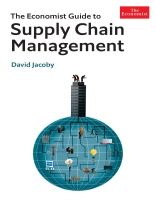Globalisation, technology and an increasingly competitive business environment have encouraged huge changes in what is known as supply chain management, the art of sourcing components and delivering finished goods to the customer as cost effectively and efficiently as possible.
Dell transformed the way people bought and were able to customise computers. Wal-Mart and Tesco have used their huge buying power and logistical skills to ensure the supply and stock management of their stores is finely honed. Manufacturers now make sure that components are where they are needed on the production line just in time for when they are needed and no longer.
Such finessing of the way the supply chain works boosts the corporate bottom line and can make the difference between being a market leader or an also ran. This guide explores all the different aspects of supply chain management and gives hundreds of real life examples of what firms have achieved in the field.
About the author
David Jacoby has been consulting to global multinational companies on operations strategy and performance improvement for over 20 years. He is the President of Boston Strategies International, a firm that provides global strategy consulting, cost and price intelligence, and market data to help manufacturers achieve competitive advantage through supply chain management. Previously, he was based in Brazil, Hong Kong and France, where he consulted on strategic sourcing, purchasing and outsourcing, shipping and logistics, acquisitions, strategic alliances, capital investments, equipment, and infrastructure.He wrote The Economist Guide to Supply Chain Management in 2009, and has contributed 250 articles and webcasts to publications such as Oil and Gas Journal, Supply Chain Management Review, Energy Tribune, and Supply Chain Quarterly. He is a frequent speaker on the economics of oil, gas, and related supply chains at conferences worldwide, and in the course of his career he has taught Operations Management at Boston University’s graduate school of business, served as a contributing editor at the Economist Intelligence Unit, and been an economist at the World Bank. He holds or has recently held board positions and other leadership roles at APICS (the Association for Operations Management), the Council of Supply Chain Management Professionals, the Institute for Supply Management (ISM) and the International Supply Chain Education Alliance (ISCEA) as a member of its Ptak Prize Selection Committee, while being a member of the Society of Petroleum Engineers (SPE).He holds an MBA from the Wharton School, a Masters in International Business from the Lauder Institute and a Bachelor of Science in Finance and Economics from the University of Pennsylvania. He is also a Certified Fellow in Production and Inventory Management (CFPIM), Certified in Supply Chain Management (CSCP), Certified in Integrated Resource Management (CIRM), Certified in Purchasing Management (Lifetime C.P.M.), and Certified in Transportation and Logistics (CTL).












